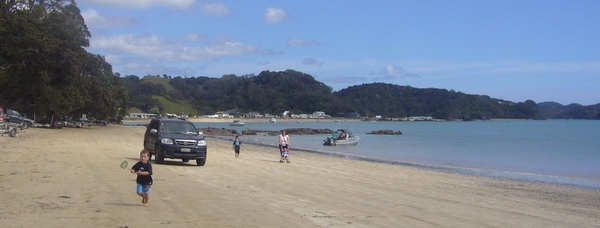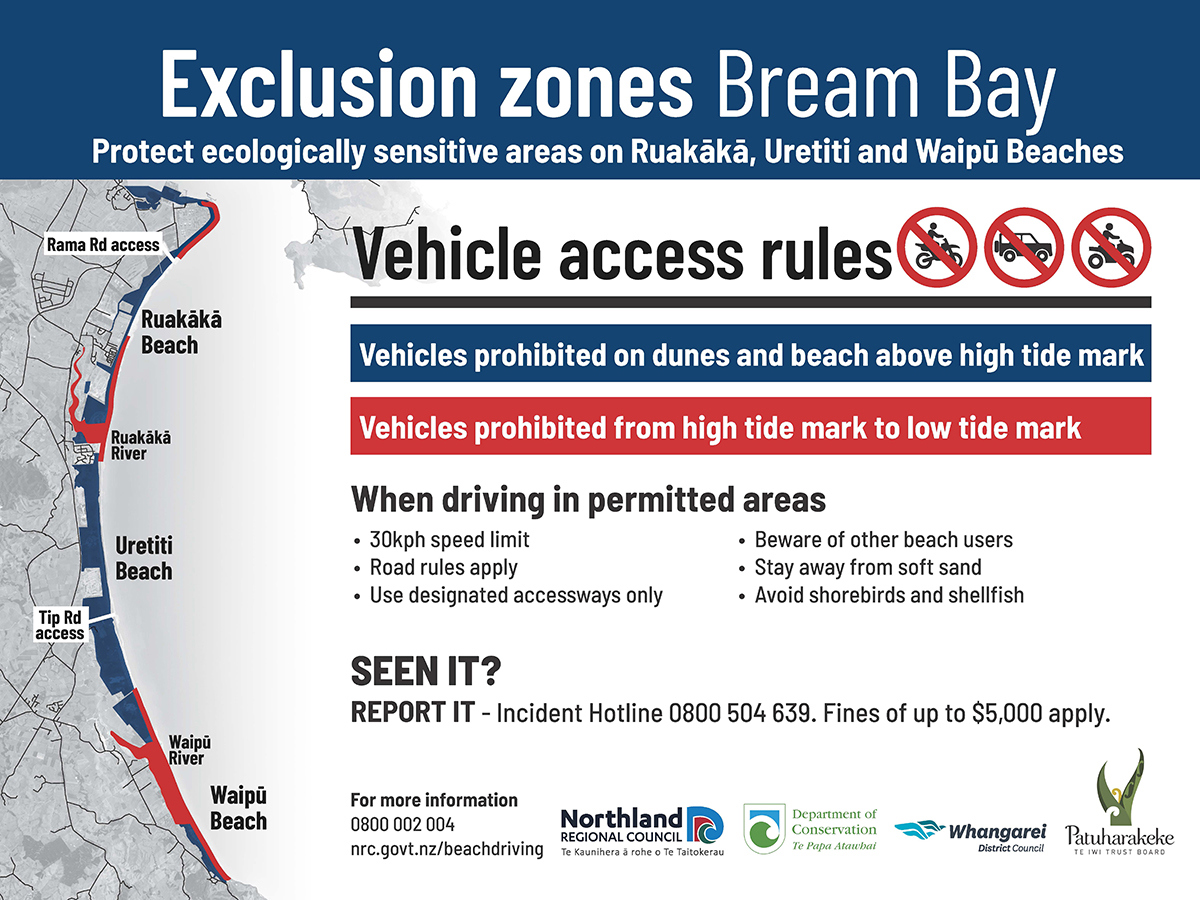Driving on beaches
Play your part, stay safe and help us protect our dunes, beaches and birdlife
Watch out for beach hazards
Conditions can change quickly on the coast
Check the tides
Identify your exit route before you go on the beach
Take extreme care when crossing streams
Soft sands are dangerous
Drive slowly and carefully
Especially near children and other beach users
Follow all road rules
Standard New Zealand rules apply on the beach
Keep off the dunes
Drive on harder sand below the high tide mark
Use only signposted vehicle accessways to the beach
Look out for vehicle restricted areas and follow the rules or you may be fined.
Vehicle restricted areas on beaches
Under new rules there are a number of areas around Te Taitokerau where driving on the beach is no longer allowed.
The new vehicle restricted areas have been introduced to protect significant ecological areas and habitats of threatened species.
Protect sand dunes
Sand dunes are narrow but important bands of sand between the land and sea. They act as buffer areas to help protect the land, people and houses from storm surges, cyclones and even tsunami. Many dunes also contain archaeological sites such as midden and koiwi (human bones).
The 'building blocks' of a dune system are its grasses, which keep the sand from drying out and being carried away by the wind. These native plants give us our distinctive coastline and are crucial to the survival of the birds, lizards and insects that live, eat and nest in them.
Sand dunes are very sensitive to vehicles driving over them. All motor vehicles and bikes can kill plants with a single pass - even the wide flotation tyres of quad bikes or the small wheels of kids' motorbikes can crush and kill plants and the creatures that live in them. Vehicles are prohibited from most dunes and should only use authorised access tracks to reach the beach.
Be aware of wildlife
The beach is home to rare birds which nest in the soft sand on the beach and lower dunes. Shorebird nests are often well camouflaged, making them vulnerable to being run over by vehicles whose drivers do not see them. Each year many eggs and chicks are unintentionally crushed by vehicles.
- Stay on the harder sand between the waterline and the high tide mark.
- Stay clear of nesting birds.
- Drive around flocks of birds - they are often resting after long periods of flying.
Safety of other beach users
The increasing number of vehicles on Northland beaches is causing problems for other beach users. People using popular beaches for activities such as swimming, sunbathing, fishing and playing sports are encountering vehicles driving at unsafe speeds and too close to children and other beachgoers.
Respect the rights of others for quiet enjoyment of our coastline – keep well away from other beach users.

Take care around people when driving on the beach.
Note: The rules that apply to vehicles on the road also apply to vehicle use on the beach!
30km/h speed limits
Whangārei district
Three beaches in Whangārei district have a 30km/h speed limit in place:
- Ohawini Bay, Oakura
- Bream Bay, between the port and Waipū Cove (outside of the no vehicle zone). Details of this are on the Whangarei District Council's website
- Langs Beach
For more information: Bylaws section: www.wdc.govt.nz to find - Control of Vehicles on Beaches Bylaw
Kaipara district
There are also 30km/h speed limits on sections of Ripiro beach, either side of the Baylys Beach and Glinks Gully beach entrances.
For more information: Speed limits on beaches information on Kaipara District Council's website.

Exclusion zones sign displayed at the Rama Road access point.
Which agency is responsible for monitoring driver behaviour?
The following organisations all share some responsibility for managing vehicles on beaches:
Police
The Police regulate dangerous behaviour and illegal vehicle use like speeding, drink driving and licences on beaches as well as on roads. Police can prosecute for criminal behaviour and bylaw breaches.
Northland's three District Councils - Kaipara, Whangārei and Far North
These are responsible for the management and use of vehicle access routes to beaches within their respective districts and on their reserves. District councils can set bylaws relating to the use of vehicles on beaches which can include vehicle exclusion areas.
Department of Conservation
The Department of Conservation sets national policies on coastal management, manages its local coastal reserves Public Conservation Land and Wildlife Refuges and protects native birds and animals that are threatened or endangered.
Northland Regional Council
We set regional rules for the use of the tidal section of beaches and also have a role in setting policies for managing the wider coastal environment.
Who to contact
To report inappropriate vehicle use on a beach, contact the relevant organisation:
- Dangerous driving or unsafe vehicle - Police
- Driver under the influence of drugs or alcohol - Police
- Damage to sand dunes/destruction of vegetation - Northland Regional Council
- Disturbance of birds/wildlife - Department of Conservation (DOC)
- Damage to Public Conservation Land - Department of Conservation
- Driving on a section of a beach where prohibited by a council - Local district council or Northland Regional Council
If possible provide the following:
- Date, time and location
- Make, model and registration of the vehicle
- Description of the driver
- Photographs
Contact information
Police
In an emergency dial 111
To report unsafe driving dial *555
Northland Regional Council
HOTLINE 0800 504 639
General enquiries 0800 002 004
Department of Conservation (DOC)
0800 DOCHOT (0800 362 468)
General enquiries contact the local office
www.doc.govt.nz
Whangārei District Council
0800 932 463 (24/7)
www.wdc.govt.nz
Kaipara District Council
0800 727 059 (24/7)
Report it function on the Antenno app
www.kaipara.govt.nz
Far North District Council
0800 920 029 (24/7)
www.fndc.govt.nz
Further information
If you have questions about the planning process to review management of vehicles on beaches, contact Northland Regional Council on 0800 002 004 or email info@nrc.govt.nz

